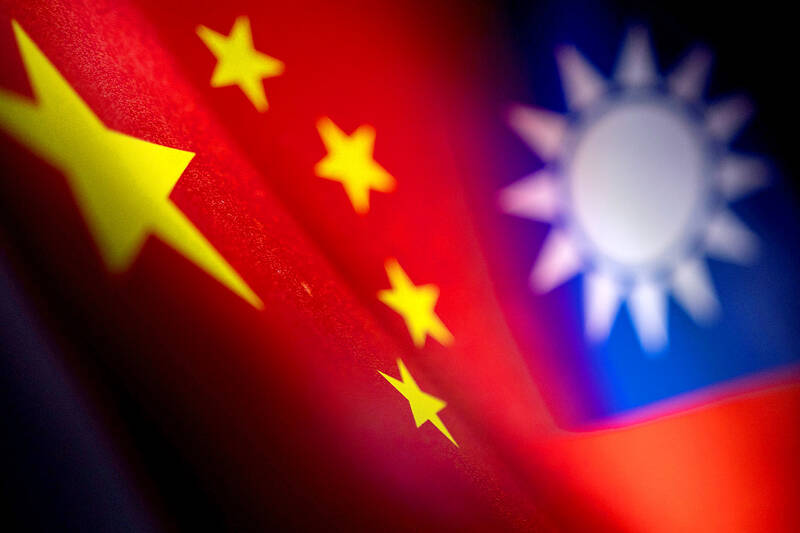A thorough investigation of more than 370,000 military personnel, civil servants and public-school teachers identified two people with Chinese citizenship, Mainland Affairs Council (MAC) Minister Chiu Chui-cheng (邱垂正) said on Friday.
Chiu made the remarks in an interview with the Chinese-language Liberty Times (sister paper of the Taipei Times), adding that the first stage of the investigation focused on agencies’ military personnel and civil servants and public-school teachers, and the scope would be expanded in following stages.
Taiwanese are prohibited from applying for or holding a Chinese passport, otherwise their Taiwanese citizenship would be revoked, according to the Act Governing Relations Between the People of the Taiwan Area and the Mainland Area (兩岸人民關係條例), he said.

Photo: Reuters
Chinese citizens are prohibited from working as military personnel, civil servants or public-school teachers, he said.
The investigation scoured the Presidential Office, the Ministry of National Defense and its affiliated units, the 52 administrative agencies of the five branches of the government and 209 public schools at all levels in the first stage, he said.
Of the 373,821 investigated people required to sign an affidavit, 371,203 people, or 99.3 percent, have complied, he said.
That demonstrated strong public support for the investigation, he said, thanking all military personnel, civil servants and public-school teachers.
Two people were found to have a Chinese ID card and 75 hold a Chinese residence permit, and the government would set up a scheme to help them annul their Chinese citizenship, he said.
Chiu warned against Chinese Nationalist Party (KMT) Legislator Chen Yu-jen’s (陳玉珍) and other KMT legislators’ proposal of amending the Offshore Islands Development Act (離島建設條例) to set up a “free-trade zone” in Kinmen County.
Setting up a free-trade zone in Kinmen was put forward as early as during former president Ma Ying-jeou’s (馬英九) administration, but it has not been implemented given the implications, Chiu said.
There are concerns that such a trade zone would become a hotbed of illicit transshipment of Chinese products as the US-China tariff and trade war is escalating, he said.
To prevent Kinmen or Lienchiang (Matsu) counties from being exploited for illicit transshipment of freight or small packages, the government would need to monitor whether there is a surge in the number of packages delivered by international shipping or through the “small three links,” he said.
The “small three links” refer to commercial, transportation and postal exchanges between Taiwan’s outlying islands and China’s Fujian Province.
The MAC would discuss the issue with authorities in Kinmen and Matsu and clamp down on illicit transshipments, Chiu said, adding that the Ministry of Finance and the Ministry of Economic Affairs have tightened regulations on Chinese packages transported to the US.
A “made in Taiwan” policy is being developed to implement a series of tight checks in customs to ensure that the nation would not be exploited, he said.

Taiwanese can file complaints with the Tourism Administration to report travel agencies if their activities caused termination of a person’s citizenship, Mainland Affairs Council Minister Chiu Chui-cheng (邱垂正) said yesterday, after a podcaster highlighted a case in which a person’s citizenship was canceled for receiving a single-use Chinese passport to enter Russia. The council is aware of incidents in which people who signed up through Chinese travel agencies for tours of Russia were told they could obtain Russian visas and fast-track border clearance, Chiu told reporters on the sidelines of an event in Taipei. However, the travel agencies actually applied

Japanese footwear brand Onitsuka Tiger today issued a public apology and said it has suspended an employee amid allegations that the staff member discriminated against a Vietnamese customer at its Taipei 101 store. Posting on the social media platform Threads yesterday, a user said that an employee at the store said that “those shoes are very expensive” when her friend, who is a migrant worker from Vietnam, asked for assistance. The employee then ignored her until she asked again, to which she replied: "We don't have a size 37." The post had amassed nearly 26,000 likes and 916 comments as of this

US President Donald Trump said "it’s up to" Chinese President Xi Jinping (習近平) what China does on Taiwan, but that he would be "very unhappy" with a change in the "status quo," the New York Times said in an interview published yesterday. Xi "considers it to be a part of China, and that’s up to him what he’s going to be doing," Trump told the newspaper on Wednesday. "But I’ve expressed to him that I would be very unhappy if he did that, and I don’t think he’ll do that," he added. "I hope he doesn’t do that." Trump made the comments in

New measures aimed at making Taiwan more attractive to foreign professionals came into effect this month, the National Development Council said yesterday. Among the changes, international students at Taiwanese universities would be able to work in Taiwan without a work permit in the two years after they graduate, explainer materials provided by the council said. In addition, foreign nationals who graduated from one of the world’s top 200 universities within the past five years can also apply for a two-year open work permit. Previously, those graduates would have needed to apply for a work permit using point-based criteria or have a Taiwanese company